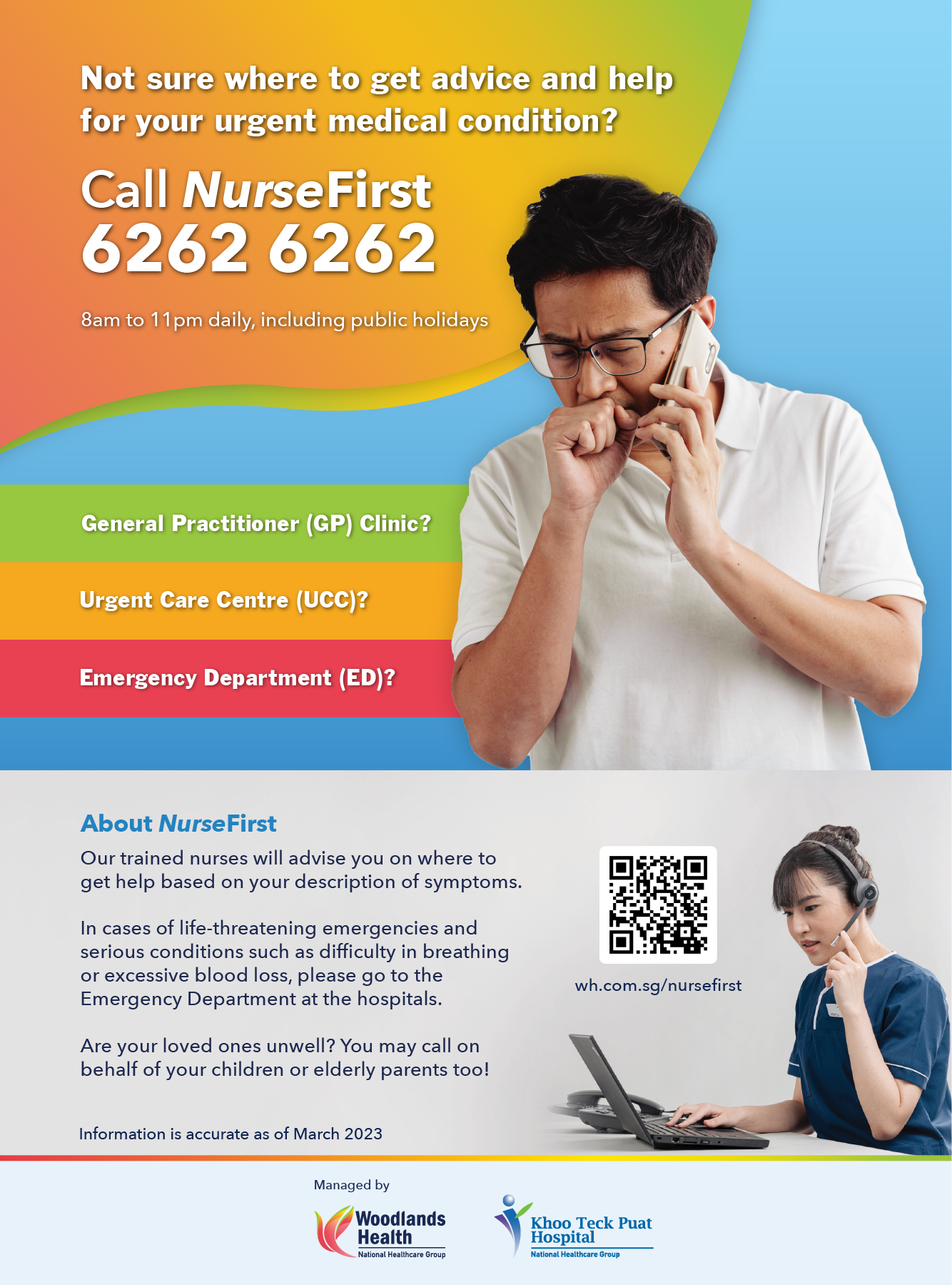Priority will be given to patients at Emergency Department who are critically ill and need immediate care.
At the Emergency Department, priority will be given to patients with life-threatening emergencies and more serious conditions who require admission.
Ng Teng Fong General Hospital is a member of the NUHS healthcare cluster, therefore patients may also be admitted to Alexandra Hospital and National University Hospital under the cluster based on their conditions and diagnosis, as determined by doctors.
The transfer is made via an ambulance and at no extra cost to the patient.
In NTFGH, we do not have paediatric facilities.
Critical patients below 16 years old will be stabilised and transferred to National University Hospital (NUH) for continuation of care. Alternatively, you may visit NUH or KK Women’s and Children’s Hospital directly.
National University Hospital
5 Lower Kent Ridge Road (Singapore 119074)
www.nuh.com.sg
KK Women's and Children's Hospital
100 Bukit Timah Road (Singapore 229899)
www.kkh.com.sg
For mild symptoms and common conditions, please visit the nearest GP or polyclinic to seek medical treatment. You may click here to search for licensed healthcare clinics and polyclinics within your location.
Alternatively, you may visit the 24-hour Urgent Care Centre (UCC) at the Alexandra Hospital.
For more information, please refer to our Frequently Asked Questions (FAQ) (PDF, 165 KB).
Your family doctor or GP plays an important role in Singapore's healthcare system, and is the first medical professional you should visit when you feel unwell. For mild to moderate conditions such as cough, runny nose or simple sprains, your GP can treat the symptoms well and make referrals to the Accident & Emergency (A&E) and/or Urgent Care Centre (UCC) under the GPFirst programme if required.
If your GP assesses that you require A&E/UCC attention, you will be provided with a referral under the GPFirst programme to the National University Hospital (NUH) A&E (excluding NUH Children's Emergency), Ng Teng Fong General Hospital (NTFGH) A&E and Alexandra Hospital (AH) UCC.
When you visit the A&E or UCC with a valid referral, you will receive a $50 subsidy on the prevailing fees at the respective A&Es or UCC (subject to terms and conditions).
More information can be found on the GPFirst page.
You can also download the GPFirst brochure here.


Please bring along the original of the following documents for registration at the Emergency Department (ED):
1. Identification Documents:
a. Birth Certificate or
b. NRIC (either original copy or digital SingPass) or
c. Passport or
d. Other identification documents (e.g. Work Permit, Employment Pass, S Pass)
2. Medical Benefits Documents (if applicable, subject to eligibility):
i. Civil Service Card (CSC)
ii. Insurance card
iii. Letter of Guarantee (Employer or insurance company)
iv. Blood Donor Card
View High-Res PDF (PDF, 45 KB)
Estimated Waiting Time: 5-10 minutes
In the process of registration, our Patient Service Associates (PSAs) will verify your identification details, and update your key information i.e., address and contact details, where necessary. Payment is to be made upon registration.
The current charges for Emergency service can be found here, and it includes standard * investigations, services and medications. Specialised emergency investigations and services will involve extra costs, hence additional charges may be incurred. If the doctors recommends for you to be admitted, the fees will be included in the total hospital bill.
* Non-standard investigations and medications will be charged at the end of your healthcare journey.
Estimated Waiting Time: 15-30 minutes
Our nurses will take your vital signs such as temperature, pulse, respiration and blood pressure, conduct an assessment of your health to identify the problem, and direct you to an appropriate area for consultation and treatment. There are various waiting areas for patients with different priority levels.
There are four different priority levels:
Patients are either in a state of cardiovascular collapse or in imminent danger of collapse, i.e. acute myocardial infarction, cardiac arrest or major trauma that require immediate medical attention. Our doctors will speak to the family members or caregivers after they have assessed and stabilised the patient.
Examples include heart attack, severe injuries, severe bleeding, shock and severe asthma attack.
Patients are unable to move on their own and in various forms of severe distress. They appear to be in a stable state upon initial cardiovascular examination and are not in danger of imminent collapse. However, they still require early attention due to the severity of their symptoms, failing which early deterioration of the medical condition may occur.
Examples include stroke, long bone fractures and asthma.
Patients show acute symptoms but are still able to move on their own. Their symptoms are mild to moderate, and acute treatment will result in the resolution of symptoms over time.
Examples include bleeding cuts, moderate injuries and persistent high fever.
PAC 4 are non-emergency cases that do not require immediate medical attention. There is no present threat to their lives and their symptoms can be managed in a primary health care setting such as a general practitioner or polyclinic.
Examples include chronic lower back pain, high cholesterol, acne, etc.
Fever Patients with positive travel history and infectious status will be managed in a separate area within the ED. This is to reduce the risk of infection to other patients in the ED.
Estimated Waiting Time: 1-3 hours
Physical examinations involving blood tests, X-rays or stay-in observation (as required) will be performed. We seek your understanding for the long waiting time that may arise from different situations such as:
Estimated Waiting Time: 15 minutes (subject to patient load)
Upon prescription of medications by our doctors, our nurses will direct patients who are fit for discharge to our pharmacy within ED for collection of medication. A pharmacist will explain to you the correct way to take your medications.
Discharged:
To be discharged means you can go home and do not need to be warded for further observation. Our nurse will prepare the following for you (as required):
* Longer waiting time may be expected when our staff prepares the referral appointment.
Estimated Waiting Time: 1-4 hours
To be admitted means you will require further observation and treatment in an inpatient ward or the Extended Diagnostic Treatment Unit (EDTU), a 24-hour short-stay ward that performs extended observation on patients.
Before admission, you and/or your family will be informed of the different classes of wards available and their estimated costs, as well as the subsidies that you are eligible for. Our staff will assist you with the admission and help you decide on your room type. More information on financial matters can be found on our charges & payment page.
A ward suitable for the treatment of your condition will be arranged for you. At times, admission may take longer when our hospital is experiencing a heavy patient load.